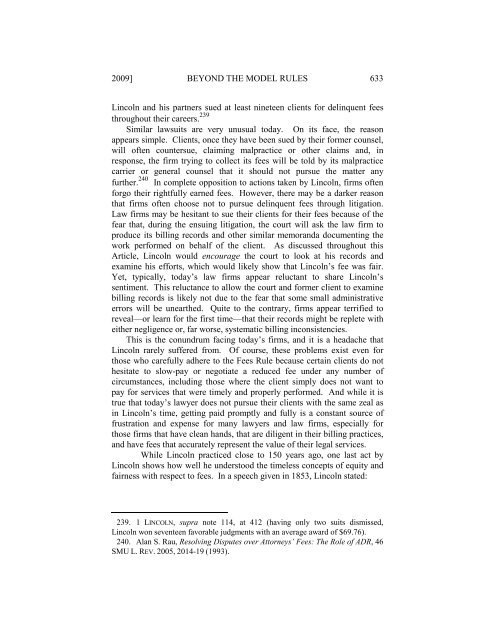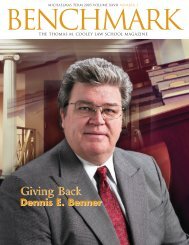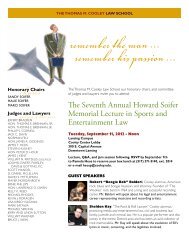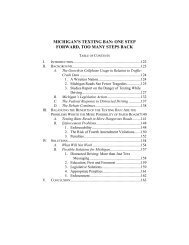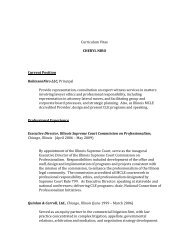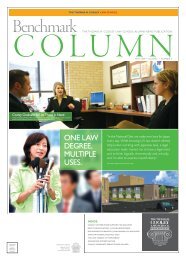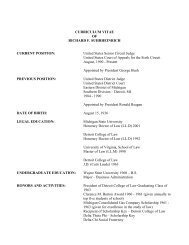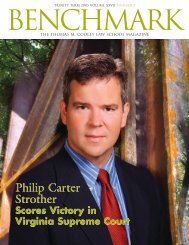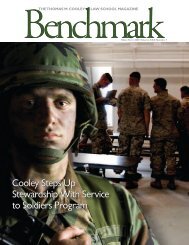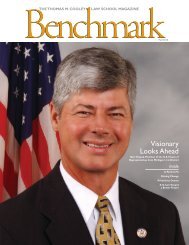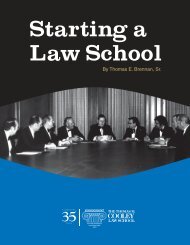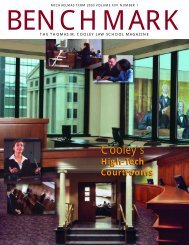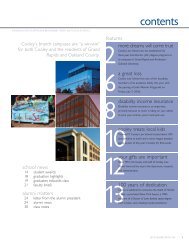Beyond The Model Rules - Thomas M. Cooley Law School
Beyond The Model Rules - Thomas M. Cooley Law School
Beyond The Model Rules - Thomas M. Cooley Law School
You also want an ePaper? Increase the reach of your titles
YUMPU automatically turns print PDFs into web optimized ePapers that Google loves.
2009] BEYOND THE MODEL RULES 633Lincoln and his partners sued at least nineteen clients for delinquent feesthroughout their careers. 239Similar lawsuits are very unusual today. On its face, the reasonappears simple. Clients, once they have been sued by their former counsel,will often countersue, claiming malpractice or other claims and, inresponse, the firm trying to collect its fees will be told by its malpracticecarrier or general counsel that it should not pursue the matter anyfurther. 240 In complete opposition to actions taken by Lincoln, firms oftenforgo their rightfully earned fees. However, there may be a darker reasonthat firms often choose not to pursue delinquent fees through litigation.<strong>Law</strong> firms may be hesitant to sue their clients for their fees because of thefear that, during the ensuing litigation, the court will ask the law firm toproduce its billing records and other similar memoranda documenting thework performed on behalf of the client. As discussed throughout thisArticle, Lincoln would encourage the court to look at his records andexamine his efforts, which would likely show that Lincoln’s fee was fair.Yet, typically, today’s law firms appear reluctant to share Lincoln’ssentiment. This reluctance to allow the court and former client to examinebilling records is likely not due to the fear that some small administrativeerrors will be unearthed. Quite to the contrary, firms appear terrified toreveal—or learn for the first time—that their records might be replete witheither negligence or, far worse, systematic billing inconsistencies.This is the conundrum facing today’s firms, and it is a headache thatLincoln rarely suffered from. Of course, these problems exist even forthose who carefully adhere to the Fees Rule because certain clients do nothesitate to slow-pay or negotiate a reduced fee under any number ofcircumstances, including those where the client simply does not want topay for services that were timely and properly performed. And while it istrue that today’s lawyer does not pursue their clients with the same zeal asin Lincoln’s time, getting paid promptly and fully is a constant source offrustration and expense for many lawyers and law firms, especially forthose firms that have clean hands, that are diligent in their billing practices,and have fees that accurately represent the value of their legal services.While Lincoln practiced close to 150 years ago, one last act byLincoln shows how well he understood the timeless concepts of equity andfairness with respect to fees. In a speech given in 1853, Lincoln stated:239. 1 LINCOLN, supra note 114, at 412 (having only two suits dismissed,Lincoln won seventeen favorable judgments with an average award of $69.76).240. Alan S. Rau, Resolving Disputes over Attorneys’ Fees: <strong>The</strong> Role of ADR, 46SMU L. REV. 2005, 2014-19 (1993).


